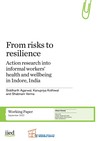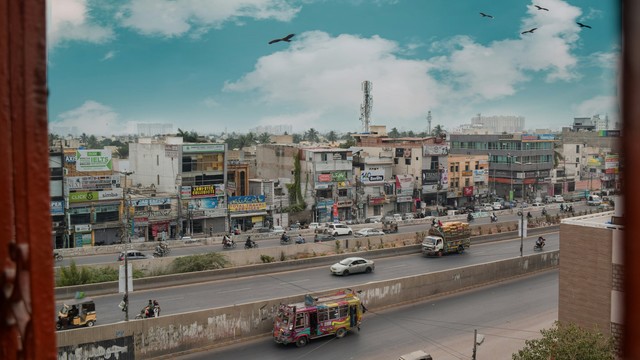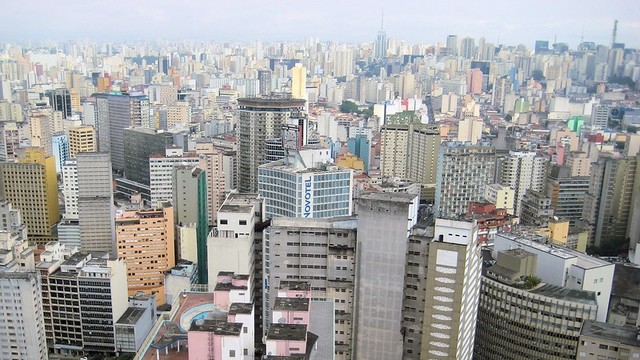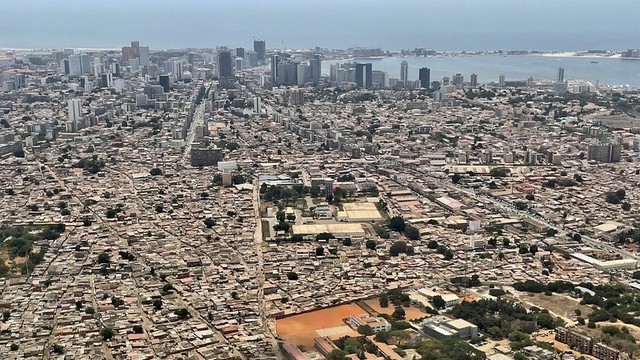From risks to resilience for informal workers – part three: research to action to address their health priorities
Our guest bloggers report on the findings of research into the health risks facing informal workers in Indore, India, and the gap that exists between conventional interventions, and what the people themselves prioritise.



Residents disposing wet and dry household waste in garbage collection van in slums (Photo: copyright Urban Health Resource Centre)
In the course of our research we discovered a gap between conventional health interventions and what informal workers themselves prioritised – such as improving housing and access to the government services to which they were entitled. These services – including pensions, subsidised food, social protection, educational scholarships, maternity benefits and subsidised electricity – all affect household or community health and wellbeing.
In another challenge to conventional thinking the research team helped households access these entitlements, as well as supporting community initiatives to demand improvements such as piped water and sewers. NGOs such as the Urban Health Resource Centre (UHRC) in every city – able to provide this kind of locally-rooted, politically-savvy support – could be the way forward. Likewise, recognising how important many non-health interventions are for informal workers’ and their families’ health is equally crucial.
Beyond data collection
The work of the UHRC includes mentoring slum-based women’s groups in addressing health and wellbeing challenges. The research involved 90 qualitative interviews with informal workers to understand their intertwining risks pertaining to living environment, climate change and other burdens. Being an NGO entrenched in research, the UHRC did not limit itself to data collection but also worked on implementing solutions to address these risks.
We also held 80 community sessions in slums and informal settlements to identify priorities. Inputs were sought from informal workers, slum-based women’s groups and frontline workers of departments of health, and women and child development.
The power of collective requests
Slum residents were motivated to collectively request civic works. Through capacity-building sessions that drew on experience from other settlements, we guided the communities in their approaches to municipal authorities.
Upgrading requests to the authorities, both written and verbal, were made for piped water supply, paving of lanes, clearing clogged sewerage pipes, laying sewerage lines and garbage collection.
The written requests were politely worded, specific to the needs of the neighbourhoods, and signed by residents. Phone numbers and photocopies of voter ID cards for three or four of the people applying were provided. This underscored the requests’ legitimacy and helped authorities to communicate with the residents.
Municipal action was not swift, so reminders were submitted. We also encouraged community representatives to submit written reminders to officials at public hearings or Jansunwai (a governance accountability mechanism) held periodically at the office of the district magistrate.
Complementing service provision with awareness-building
Service provision benefits the community better when behaviour promotion efforts are done at the same time. For example, in lanes where desired garbage-disposal practices were adopted, there was much better waste management. Likewise, utilisation of health outreach and Anganwadi (mother and child health centres) services increased with awareness, particularly among the most vulnerable.
We encouraged the use and formation of women’s savings groups where members could save regularly, and borrow money for house improvements or other family needs – at a low interest rate. Women who had made their homes climate resilient ‘brick by brick’ using such loans shared their experiences.
Collective requests do work
Practical outcomes that brought real benefits included:
- Lanes paved in four slums (769 households)
- Choked sewerage lines cleaned in four slums (670 households)
- New sewerage lines laid in one slum (492 households)
- Garbage-collection truck started arriving in four slums (331 households)
- Water connections already laid from the Narmada river activated in six slums (1,132 households)
- A new Narmada household water pipeline being laid in one slum is likely to eventually benefit 335 households, and
- Streetlights activated in one slum lane (92 households).
(Average household size is five residents).
Gallery of images of slum residents motivated to collectively progress on city upgrading. Click on each image to enlarge it (Photos: copyright Urban Health Resource Centre)
Lessons
Key lessons learnt were that:
- Collective efforts, such as polite community requests and amiable negotiation, can mobilise government funding to upgrade informal settlements. Informal workers and their communities need support and motivation from civil society organisations as the process is time consuming, and civic responses can be uncertain
- Residents can gradually improve their housing ‘brick-by-brick’ over several years by saving regularly in slum women’s groups
- Promoting behavioural change effectively complements service provision, and
- Local experiential wisdom is crucial. Those who are willing to share their experiences propagate their success strategies. For example, UHRC is promoting local initiatives to store grain and water.
Editor’s note: some may find the comment about ‘polite community requests for services and amiable negotiation’ a bit odd. But government officers and politicians respond far more positively to requests from representative community organisations such as women’s savings groups that are non-confrontational and when the request is clear and doable.
Local NGOs contributing to research and policy implementation
Owing to the cooperation of members of a strong network of slum-based women’s groups, the UHRC was able to uncover the deep-seated risks faced by informal workers in Indore, and help them identify their priorities.
The action component of the research is successfully promoted by local research institutions that are embedded in the community. These NGOs can elicit ‘health and wellbeing’ priorities from informal settlement dwellers to inform the research and promote effective action.
Donor agencies and Western institutions can learn from research partnerships such as these to add greater value to outputs which can also be used for teaching. NGOs such as the UHRC can train community groups to ‘amiably negotiate’ with municipal authorities for upgrades to urban services.
Although budgets may be allocated to cities under different policies and programmes, their utilisation could be improved by such ‘demand-side efforts’, where the community spurs civic authorities into action.
- Download the report containing detailed coverage of the various risks and coping mechanisms adopted by workers







